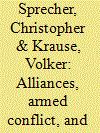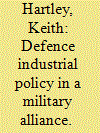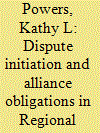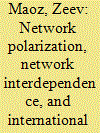|
|
|
Sort Order |
|
|
|
Items / Page
|
|
|
|
|
|
|
| Srl | Item |
| 1 |
ID:
072700


|
|
|
|
|
| Publication |
2006.
|
| Summary/Abstract |
Existing research on the connection between alliance formation and conflict initiation has explicitly focused on the direct effect of alliances on conflict by including some measure of alliance behavior as an independent variable in models of conflict behavior. Existing research misspecifies the relationship between alliances and conflict, because alliance formation and conflict initiation are shaped by many of the same factors (in particular, regime type and capabilities), and alliance formation decisions are endogenous to conflict initiation decisions. Thus, alliance formation and conflict initiation should be modeled in a system of equations where a set of variables shapes alliance formation and conflict directly, and indirectly affects conflict through the decision to ally. The author estimates a two-equation probit model that accounts for the endogenous nature of alliance formation decisions and, thus, for the indirect effects of variables like regime and power on conflict. Results suggest that the effect of regime on alliance behavior differs across time periods. Finally, the model provides evidence that the total effects of variables like power and regime on conflict are, in fact, mediated by how those variables influence the decision to ally.
|
|
|
|
|
|
|
|
|
|
|
|
|
|
|
|
| 2 |
ID:
072699


|
|
|
|
|
| Publication |
2006.
|
| Summary/Abstract |
Alliances are subject to many scholarly inquiries in international relations and peace research because they are major instruments of foreign and security policies. Since the early work on alliances produced by the Correlates of War (COW) project, there have been significant advances in conceptual, theoretical, and empirical alliance research. New typologies and data permit us to differentiate more thoroughly among a variety of alliance objectives and functions. Furthermore, there has been new theoretical and empirical research on alliance formation, alliance configuration/polarization, effects of alliances on military conflict, connections between alliances and trade, and the economics of alliances. Providing new theoretical approaches, data, and empirical evidence on alliances, this special issue includes articles that address alliance formation, alliance polarization, alliances and democratization, trade among allies, regional economic institutions with alliance obligations, and defense industrial policies of military alliances. The articles in this issue extend our understanding of alliances past the traditional realist balance-of-power framework and encourage further testing and refinement of older alliance arguments and extensions to new theoretical developments.
|
|
|
|
|
|
|
|
|
|
|
|
|
|
|
|
| 3 |
ID:
072705


|
|
|
|
|
| Publication |
2006.
|
| Summary/Abstract |
Much of the alliance literature has focused on the collective defence benefits and burden-sharing. This article considers the potential for developing a defence industrial policy in a military alliance. Previous proposals from the literature are reviewed, especially proposals for economic specialization based on comparative advantage applied to both armed forces and defence industries in a military alliance. European Union (EU) defence policy is outlined, including its armaments agencies (OCCAR and the European Defence Agency), and inefficiencies in EU defence markets are identified. Economic theory offers some policy guidelines for an efficient defence industrial policy in a military alliance, including gains from trade and competition, from learning and scale economies, and from reducing the duplication of costly R&D. These economic principles are applied to the EU and are also applicable to NATO. Evidence of efficiency gains from trade and from economies of scale and learning is reviewed and applied to various scenarios for the creation of a Single European Market for defence equipment. The scenarios include a liberalized competitive market, a centralized EU procurement agency and a 'twin-track' model. Estimates are presented of the cost savings from these scenarios. However, proposals for an efficient defence industrial policy will be opposed by the potential losers who will prefer alternative industrial policies involving international collaboration and offsets. Among these alternatives, collaboration is assessed as a distinctive European policy. The inefficiencies of collaboration are reviewed, including its impact on development and production costs and on delays in delivery. Consideration is given to the research issues to be addressed by an economic evaluation of European collaborative projects. The article concludes by stressing the inefficiencies of current procurement policies in the EU and NATO and the potential cost savings from the adoption of a more efficient defence industrial policy within an alliance.
|
|
|
|
|
|
|
|
|
|
|
|
|
|
|
|
| 4 |
ID:
072704


|
|
|
|
|
| Publication |
2006.
|
| Summary/Abstract |
States increasingly incorporate alliance obligations into the design of multilateral trade agreements to deter aggression. Regional economic institutions (REIs) are such an example. This policy activity raises the question of whether REI military alliance obligations send signals and function as institutional constraints that deter aggression. Hypotheses regarding the influence of (1) shared REI military alliance obligations on dispute initiation and (2) REI military alliance obligations on whether a potential challenger will initiate a militarized dispute against a potential target are tested. African REIs, states, and their dispute initiations from 1950 to 2000 compose the sample. Logit analysis of time-series, cross-section data is the method employed. African REI military alliances are an example of African international relations' exceptionalism and innovation in institutional design. Findings suggest African REI military alliance obligations reduce the propensity for aggression between member-states and reduce the likelihood that a potential challenger will attack a potential target and a potential target will be the object of attack. The evidence in this article indicates that such commitments reduce dispute initiation among African states.
|
|
|
|
|
|
|
|
|
|
|
|
|
|
|
|
| 5 |
ID:
072702


|
|
|
|
|
| Publication |
2006.
|
| Summary/Abstract |
This article examines the role of NATO in aiding democratic transitions and survival in the former Soviet republics. The authors argue that the level of external threat is a determining factor in centralization, militarization, and ultimately regime type. States tend to be democratic or are likely to make the transition toward democracy when threat levels are low, while autocracies are more likely to be found in states targeted by higher levels of threat. Building on recent findings examining the link between democracies and alliance, the authors demonstrate that NATO has been an effective guarantor of territorial sovereignty and independence in the Baltic states, Ukraine, and Moldova, reducing the level of threat experienced by each state, thus assuring the survival of decentralized and democratic governments. Former Soviet republics targeted by high levels of threat have reverted to or maintained centralized, autocratic forms of government.
|
|
|
|
|
|
|
|
|
|
|
|
|
|
|
|
| 6 |
ID:
072701


|
|
|
|
|
| Publication |
2006.
|
| Summary/Abstract |
This study examines the effect of polarization and interdependence on systemic conflict. It argues that both polarization and interdependence must be conceptualized in terms of different types of relations among states and that different relationships would reflect varied levels of polarization and inter-dependence. Accordingly, this study develops general measures of network polarization and interdependence that allow measurement of these concepts over a wide array of international relations. Hypotheses are deduced from the realist and liberal paradigms about how alliance polarization, trade polarization, and cultural polarization affect systemic conflict. Likewise, hypotheses are deduced regarding the expected effects of strategic and economic interdependence on conflict. These hypotheses are tested using data on alliance, trade, linguistic, and religious networks over the period 1816-2002. The findings suggest that alliance polarization and strategic interdependence increase the amount of systemic conflict, while trade polarization and economic interdependence have a dampening effect on the amount of conflict in the international system. The theoretical implications of these results are discussed.
|
|
|
|
|
|
|
|
|
|
|
|
|
|
|
|
| 7 |
ID:
072703


|
|
|
|
|
| Publication |
2006.
|
| Summary/Abstract |
The authors appraise a well-known argument connecting economics and security in international relations: military allies are likely to trade more with one another than non-allies. A review of alliance treaties and diplomatic history suggests that, under certain conditions, states may tie together alliance agreements and economic agreements. When states explicitly link alliance agreements with economic cooperation, one would expect to see increased economic exchange coinciding with coordinated security policies. This article evaluates whether the linking of economic and security agreements accounts for a positive relationship between alliances and trade among European states before World War II and produces evidence in support of this argument. Trade among allies who have specified economic cooperation in their alliance agreements is higher than trade among non-allied states and higher than trade among allies who have not promised economic cooperation. In contrast, trade among allies without specific economic provisions in their treaties is statistically no different from trade among non-allies. Thus, the positive empirical relationship between alliances and trade that the authors find in pre-WWII Europe is a result of only a specific subset of all military alliances, namely, those treaties that stipulate economic cooperation between the allies. This study advances our understanding of the alliance-trade relationship by focusing attention on the joint negotiation of cooperation in different issue-areas.
|
|
|
|
|
|
|
|
|
|
|
|
|
|
|
|
|
|
|
|
|